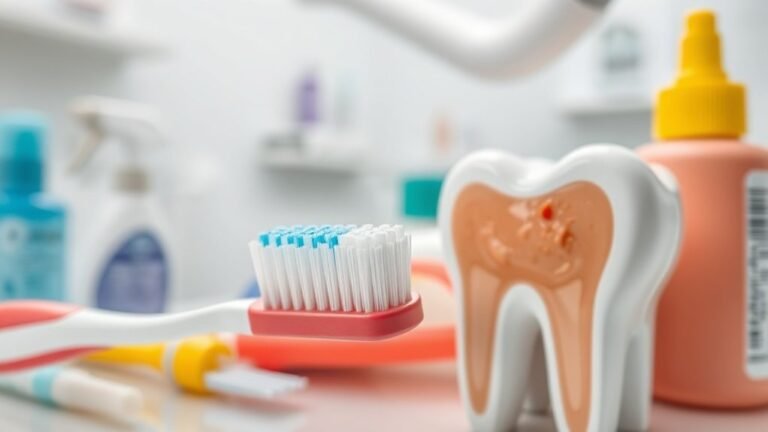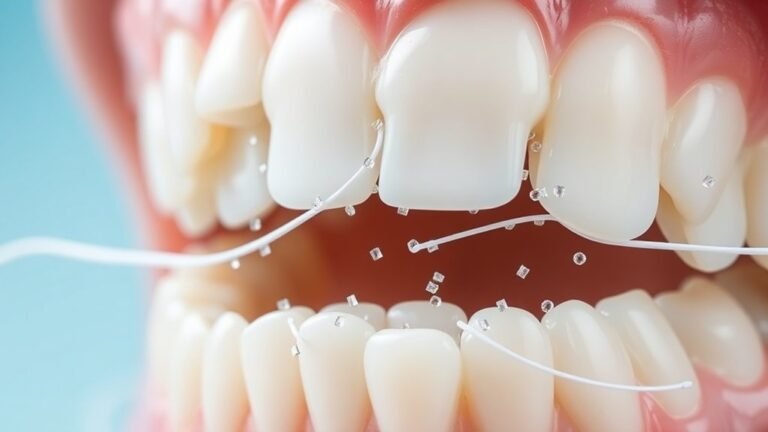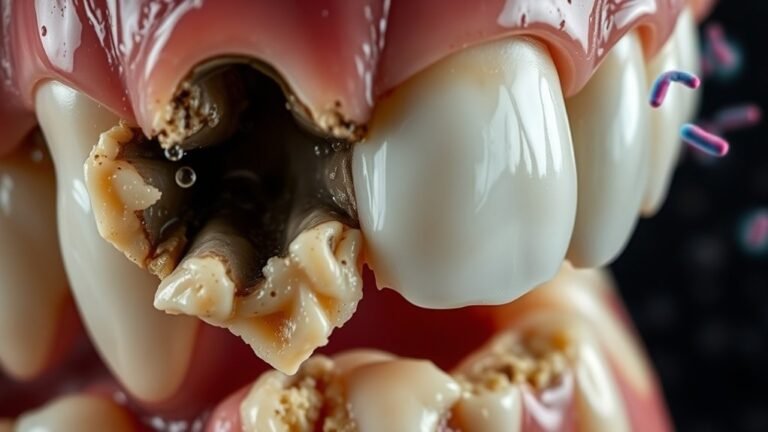Can Changing Your Toothpaste Formula Reduce Plaque Formation
Yes, changing your toothpaste formula can reduce plaque formation. By selecting a toothpaste with active ingredients like fluoride, pyrophosphates, or zinc citrate, you can enhance plaque removal and inhibit harmful bacteria growth. Fluoride promotes enamel remineralization, while tartar control ingredients help prevent plaque hardening. It’s essential to choose the right formula for your specific dental needs. However, understanding the unique benefits of different types can further optimize your oral health.
Key Takeaways
- Switching to toothpaste with fluoride enhances enamel remineralization and helps prevent plaque buildup by inhibiting harmful bacteria growth.
- Tartar control toothpaste containing pyrophosphates and zinc citrate effectively prevents plaque from hardening into tartar, aiding in plaque reduction.
- Choosing toothpaste with balanced abrasiveness ensures effective plaque removal without risking enamel damage or insufficient cleaning.
- Personalizing toothpaste selection based on individual dental needs, such as sensitivity or antibacterial properties, can significantly improve plaque control.
- Regular use of active ingredient-containing toothpaste has been linked to lower plaque scores in clinical studies, supporting better overall oral health.
Understanding Plaque Formation
Plaque formation is a complex process that begins with the accumulation of bacteria on your teeth. As you consume sugars and carbohydrates, oral bacteria metabolize these substances, producing acids that contribute to enamel erosion. This acidic environment encourages the growth of specific bacteria, forming a biofilm that adheres to your tooth surfaces. If you don’t remove this biofilm through regular brushing and flossing, it hardens into tartar, making plaque removal more difficult. Research shows that certain strains of oral bacteria are more aggressive in plaque formation, leading to dental issues like cavities and gum disease. By understanding these mechanisms, you can make informed choices about oral hygiene and toothpaste, ultimately reducing plaque formation and maintaining better oral health.
The Role of Fluoride in Toothpaste
Fluoride plays a significant role in combating plaque-related issues by enhancing the remineralization process of tooth enamel. When you use fluoride toothpaste, it interacts with the minerals in your saliva, helping to restore lost minerals and strengthen enamel. This process not only protects your teeth from decay but also aids in plaque removal. Research shows that fluoride can inhibit the growth of harmful bacteria responsible for plaque formation, reducing your risk of cavities. Additionally, fluoride helps to disrupt the acid production of these bacteria, further diminishing plaque buildup. By choosing a toothpaste with fluoride, you’re actively contributing to the health of your teeth and minimizing the impact of plaque on your oral hygiene.
Herbal Toothpaste: A Natural Alternative
Herbal toothpaste often contains ingredients like neem, peppermint, and clove, known for their antibacterial properties. These natural components not only help combat plaque formation but also promote overall dental health. By choosing herbal options, you may benefit from a gentler, chemical-free approach to oral hygiene.
Ingredients in Herbal Toothpaste
A variety of natural ingredients in herbal toothpaste offer effective alternatives to conventional formulations. You’ll often find ingredients like neem, which has antibacterial properties, and tea tree oil, known for its antiseptic qualities. These natural ingredients can help maintain oral health without harsh chemicals. Aloe vera is another common component, promoting gum health and soothing irritation. Additionally, baking soda serves as a gentle abrasive, assisting in the removal of plaque while being less abrasive than synthetic alternatives. Essential oils, such as peppermint or clove, not only provide a invigorating taste but also contribute to overall oral health. By choosing herbal toothpaste, you’re opting for oral health products that prioritize natural efficacy over artificial additives, aligning with a more holistic approach to dental care.
Benefits for Dental Health
While many people rely on conventional toothpaste for dental care, opting for herbal alternatives can provide significant benefits for your oral health. Herbal toothpaste often contains natural ingredients that enhance dental hygiene and promote cavity prevention. For instance, ingredients like neem and clove oil are known for their antibacterial properties, helping to reduce plaque and fight decay.
| Benefit | Description |
|---|---|
| Natural Ingredients | Fewer chemicals, less irritation |
| Antimicrobial Action | Helps combat harmful bacteria |
| Cavity Prevention | Supports enamel health |
Switching to herbal toothpaste can lead to a gentler, more effective oral care routine. By embracing these natural options, you’re investing in a healthier smile and better overall dental hygiene.
Whitening Toothpaste and Plaque Control
When you choose whitening toothpaste, you might wonder how effective the whitening agents are in combating plaque. Research suggests that certain plaque-busting ingredients, like fluoride and baking soda, can enhance the overall cleaning power of these products. Understanding the balance between whitening effectiveness and plaque control can help you make an informed choice for your oral health.
Whitening Agents Effectiveness
Although whitening toothpastes often promise a brighter smile, their effectiveness in controlling plaque formation warrants careful examination. Many of these formulations contain mild abrasives and whitening agents designed to remove surface stains. However, research shows that while they can improve tooth appearance, they may not considerably reduce plaque buildup. The primary function of toothpaste is to clean teeth and prevent cavities, and whitening agents often don’t contribute to plaque control. In addition, some whitening ingredients can be harsh, potentially leading to enamel erosion. Consequently, if you’re focused on combating plaque, consider a toothpaste formula specifically designed for plaque control rather than relying solely on whitening properties. Always evaluate your oral hygiene needs to choose the most effective product.
Plaque-Busting Ingredients
Toothpaste formulations designed for effective plaque control often incorporate a variety of plaque-busting ingredients that can enhance oral hygiene. Ingredients like fluoride not only strengthen enamel but also help in reducing plaque formation. Triclosan, an antibacterial agent, actively targets the bacteria responsible for plaque buildup, promoting better oral health. Additionally, xylitol, a natural sugar alcohol, inhibits bacterial growth, making it a powerful ally in plaque control. Some whitening toothpastes contain silica-based abrasives that can mechanically remove plaque while brightening your smile. Including these plaque-busting ingredients in your daily routine can considerably improve your oral hygiene, ensuring you’re not just whitening your teeth but also maintaining healthy gums and preventing cavities. Prioritize toothpaste with these effective components for ideal oral health.
The Impact of Tartar Control Formulas
While many people might underestimate the role of tartar control formulas in oral hygiene, these specialized toothpastes play an essential role in preventing plaque buildup and maintaining gum health. Tartar control toothpastes contain active ingredients like pyrophosphates and zinc citrate, which inhibit the mineralization of dental plaque into tartar. By using these formulas, you effectively reduce the risk of plaque accumulation, which is vital for preventing gum disease and cavities. Clinical studies indicate that regular use of tartar control toothpaste leads to lower plaque scores compared to standard formulas. Therefore, incorporating a tartar control toothpaste into your daily routine can considerably enhance your oral hygiene efforts, ensuring healthier gums and a brighter smile. Choose wisely for best results.
Sensitivity Toothpaste: Effects on Oral Health
Sensitivity toothpaste plays an essential role in managing discomfort for those with sensitive teeth. By using these specialized formulas, you can experience significant benefits that extend beyond mere pain relief, positively impacting your overall oral health. Consider the following effects:
- Reduces tooth sensitivity during hot or cold exposure.
- Protects gum health by minimizing inflammation.
- Strengthens enamel, reducing the risk of cavities.
- Enhances comfort, allowing you to enjoy a wider range of foods and beverages.
Research indicates that sensitivity toothpaste contains compounds like potassium nitrate or strontium chloride, which help calm nerve endings in the teeth. Regular use not only alleviates discomfort but also supports gum health, leading to a healthier mouth overall. Prioritize your oral care with sensitivity toothpaste for lasting relief.
The Importance of Abrasiveness in Toothpaste
The abrasiveness of toothpaste plays an essential role in effective oral hygiene. It helps in removing plaque and food particles, leading to better dental cleaning. However, too much abrasiveness can damage tooth enamel. You need to find a balance that promotes cleaning without causing harm.
| Abrasiveness Level | Impact on Dental Cleaning |
|---|---|
| Low | Minimal plaque removal |
| Moderate | Effective cleaning |
| High | Risk of enamel damage |
Choosing the right toothpaste is vital. Look for products with a balanced abrasiveness to guarantee you’re getting the most benefit without compromising your enamel. A well-formulated toothpaste can considerably enhance your oral health by efficiently managing plaque while protecting your teeth.
Ingredients to Avoid for Optimal Plaque Control
When selecting toothpaste for ideal plaque control, it is crucial to avoid certain ingredients that can undermine your dental health. Some components may disrupt your oral care routines and hinder effective plaque removal. Consider steering clear of:
- Harsh abrasives that can damage enamel.
- Fluoride-free formulas, reducing antibacterial effectiveness.
- Sodium lauryl sulfate (SLS), which can irritate gums and lead to inflammation.
- Artificial sweeteners, potentially fostering harmful bacteria growth.
Choosing toothpaste without these ingredients can enhance your plaque control efforts. Prioritize products that feature antibacterial agents to effectively combat harmful bacteria while maintaining your oral health. Your choice of toothpaste directly influences your overall dental hygiene, so make informed decisions to keep your smile bright and healthy.
Personalizing Your Toothpaste Choice for Better Results
Selecting the right toothpaste goes beyond avoiding harmful ingredients; it involves tailoring your choice to your specific dental needs. For instance, if you’re prone to tooth decay, look for a toothpaste with fluoride, which strengthens enamel and helps prevent cavities. Additionally, consider how your toothpaste interacts with your oral microbiome. Some formulations promote beneficial bacteria while inhibiting harmful ones, thereby supporting overall gum health. If you have sensitivity issues, a toothpaste designed for sensitive teeth can alleviate discomfort. Always check for specific claims, such as anti-plaque or tartar control, to guarantee the product aligns with your goals. By personalizing your toothpaste choice, you can enhance your oral health and reduce plaque formation effectively.
Frequently Asked Questions
How Often Should I Change My Toothpaste Formula?
You should consider changing your toothpaste formula every six months to a year, especially if you notice reduced effectiveness or changes in your oral health. Regularly evaluating your toothpaste guarantees ideal dental care and plaque management.
Can Toothpaste Alone Prevent Plaque Buildup?
Toothpaste alone can’t fully prevent plaque buildup; studies show that nearly 70% of plaque forms within 24 hours. Regular brushing, combined with flossing and mouthwash, is essential for effective plaque control and overall oral health.
Is a Higher Price Always Better for Plaque Control?
A higher price isn’t always indicative of better plaque control. Effectiveness depends on active ingredients and your personal dental needs, so evaluate products based on their formulation rather than just their price tag for ideal results.
Are There Specific Brands Recommended for Plaque Prevention?
For plaque prevention, popular picks include Procter & Gamble’s Crest and Colgate’s Total, both boasting beneficial ingredients like fluoride. These brands blend effective formulas that fight plaque while promoting overall oral health, ensuring your smile stays bright and healthy.
How Long Does It Take to See Results From New Toothpaste?
You’ll typically notice results from a new toothpaste within two to four weeks. Consistent use, along with proper brushing techniques, maximizes effectiveness in plaque reduction and overall oral health improvement.
Conclusion
While you might think that simply switching to a trendy herbal toothpaste will magically banish plaque, the reality is more nuanced. The effectiveness of your chosen formula hinges on its active ingredients, abrasiveness, and your unique oral needs. Ironically, the toothpaste you overlook at the drugstore might be the one that gives you the brightest smile. So, choose wisely—your plaque-free future could depend on it, even if it means skipping that fancy marketing hype.






